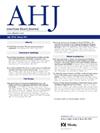临时机械循环支持管理的当前做法:对北美 CICU 主任的调查
IF 3.7
2区 医学
Q1 CARDIAC & CARDIOVASCULAR SYSTEMS
引用次数: 0
摘要
导言尽管临时机械循环支持(tMCS)的使用越来越多,但几乎没有数据可以为这些设备的管理和断流提供参考。方法我们对北美地区的心脏重症监护室主任进行了在线调查,以了解目前使用主动脉内球囊反搏泵和 Impella 治疗患者的管理方法。我们的调查侧重于日常管理的三个关键方面:1.血液动力学监测;2.血液兼容性;3.断流和移除。结论我们的调查结果表明,有必要就改善接受 tMCS 治疗的患者预后的相关做法达成共识。本文章由计算机程序翻译,如有差异,请以英文原文为准。
Current practices in the management of temporary mechanical circulatory support: A survey of CICU directors in North America
Introduction
Despite the growing use of temporary mechanical circulatory support (tMCS), little data exists to inform management and weaning of these devices.
Methods
We performed an online survey among cardiac intensive care unit directors in North America to examine current practices in the management of patients treated with intraaortic balloon pump and Impella.
Results
We received responses from 84% of surveyed centers (n=37). Our survey focused on three key aspects of daily management: 1. Hemodynamic monitoring; 2. Hemocompatibility; and 3. Weaning and removal. We found substantial variability surrounding all three areas of care.
Conclusion
Our findings highlight the need for consensus around practices associated with improved outcomes in patients treated with tMCS.
求助全文
通过发布文献求助,成功后即可免费获取论文全文。
去求助
来源期刊

American heart journal
医学-心血管系统
CiteScore
8.20
自引率
2.10%
发文量
214
审稿时长
38 days
期刊介绍:
The American Heart Journal will consider for publication suitable articles on topics pertaining to the broad discipline of cardiovascular disease. Our goal is to provide the reader primary investigation, scholarly review, and opinion concerning the practice of cardiovascular medicine. We especially encourage submission of 3 types of reports that are not frequently seen in cardiovascular journals: negative clinical studies, reports on study designs, and studies involving the organization of medical care. The Journal does not accept individual case reports or original articles involving bench laboratory or animal research.
 求助内容:
求助内容: 应助结果提醒方式:
应助结果提醒方式:


